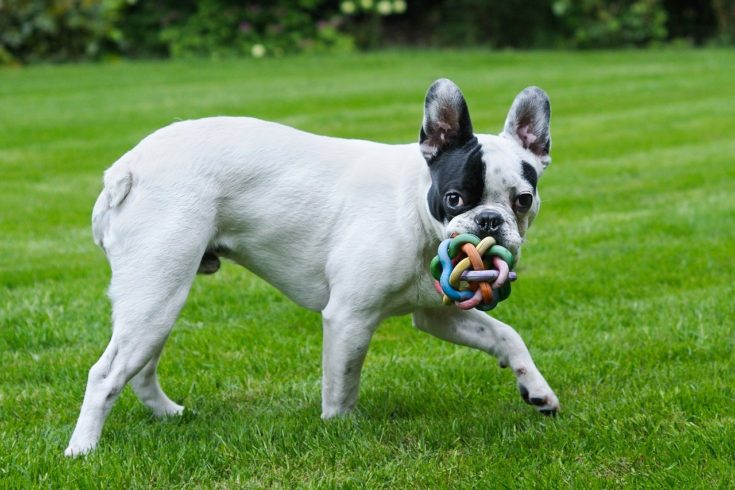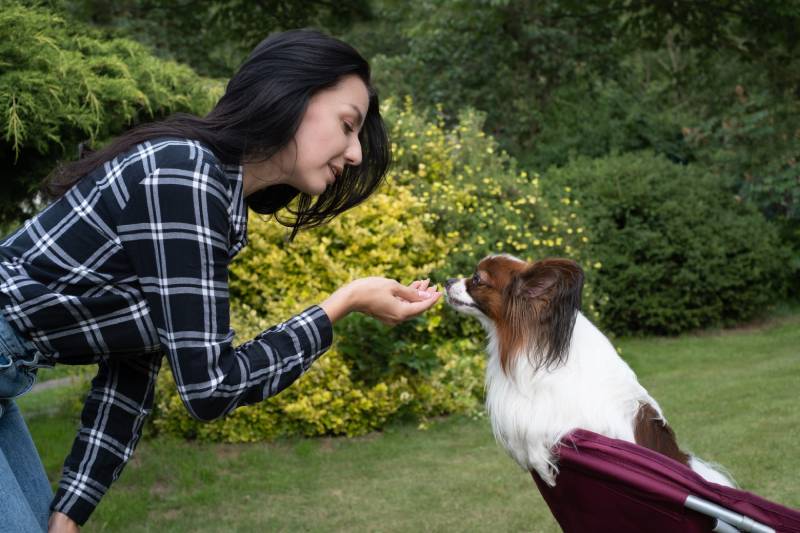How Strong Is a French Bulldog’s Bite Force? Vet-Reviewed Facts
Updated on

Brachycephalic breeds like the French Bulldog have shorter facial bones and tend to pack a lot more biting power in their small frames than dogs with longer muzzles. However, the Frenchie seems to be an outlier in this equation. Their bite force hovers around 180 to 230 psi, which is even less than the average dog bite of 240 psi. Though their bite force is rather weak, Frenchies are known for clamping down their jaws. They can stubbornly chomp down and tug on toys and objects they don’t want you to have. If your dog likes to bite inappropriately, you can train them to redirect that force in a positive way.
How Is Bite Force Measured?
Bite force is calculated according to pounds per square inch (psi). There are various methods of figuring out bite force, and researchers tend to use a combination in their data because each way has its flaws.
Some researchers test bite force with dogs under general anesthesia by electrically simulating bite force. However, this method has its disadvantages because it doesn’t capture a natural response. Scientists can also measure bite force by testing a dog’s chew strength on a toy, but sometimes these results can be skewed because one dog might not be as interested in the toy as the next.
The American Bulldog is one of the Frenchie’s close cousins and has a super strong bite force of 305 PSI. However, perhaps due to its smaller size, the Frenchie lags behind, coming between 180 to 230 psi. They have a weaker bite force than most dogs on the whole, with the average bite force coming in at 240 psi.

Are French Bulldogs Aggressive?
Although Frenchies are closely related to their strong cousins, they tend to be weaker than other brachycephalic breeds and are unlikely to be aggressive. Of course, this depends more on the dog than the breed itself since any animal can be trained to be mean.
How to Prevent Your Dog From Biting
It’s common for puppies to want to bite you, but you should discourage this behavior as soon as it happens. You can allow mouthing, but you should teach them bite inhibition so that they learn not to bite down. Puppy nibbles can quickly turn into painful chomps, and your Frenchie needs to know that’s not okay. If your dog tries to bite you for fun, firmly say, “No bite,” and redirect their attention to a durable chew toy that they enjoy. Give them praise once they start to play with the toy.
Some dogs respond better to a “game over” mentality. For these dogs, they need to know that biting will cause them to be temporarily ignored. If that’s the case, tuck your hands in your pockets so your dog can’t continue to bite you and don’t look at them for 20 to 60 seconds.
When you discipline your puppy, try to keep your voice calm and level. Too much excitement can lead your dog to think biting you is a game, but aggressively scolding them may make them feel afraid. Frenchies, especially, tend to be sensitive animals, so it’s important to be direct but not overly harsh.

Conclusion
While Frenchies are not the strongest dog of their close relations, any dog bite can be painful. Start teaching them bite inhibition when they’re puppies so they know that mouthing is okay but chomping down isn’t an accepted form of play. The good news is that Frenchies don’t tend to be aggressive, so with the proper training, they’ll be friendly dogs who love to chew and play.
Featured Image Credit: Tienuskin, Shutterstock













